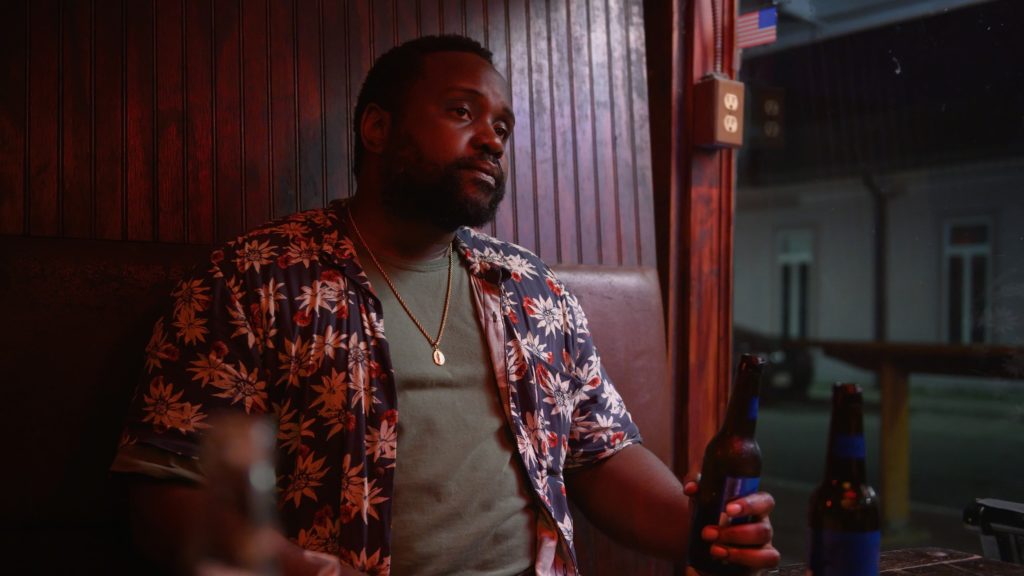Lawrence of suburbia
Here’s the logline of Causeway according to IMDb: “A US soldier suffers a traumatic brain injury while fighting in Afghanistan and struggles to adjust to life back home.” It sounds like exactly the type of movie that the Academy Awards love to honor and exactly the kind of emotionally bleak slog I hate. If not for my goal to see every Oscar nominee this year, I’m not sure I would have given this one a chance.
Imagine my surprise that I actually kind of loved Causeway. It turns out that the logline, while not quite inaccurate, doesn’t paint a picture for what the movie is really about. It’s background that provides texture to the story, but not the premise itself. Causeway, really, is a quasi-romantic hangout dramedy between two broken people who discover each other and subsequently become a little less broken. See, if they had pitched it that way, I’d have hunted this one down with enthusiasm, maybe even seen it at the local art theater.

The film follows Lynsey (Jennifer Lawrence; also the producer), who does indeed return home with a brain injury, but all of that takes up the film’s first ten minutes. She gets a job cleaning pools and one day crashes her mom’s pickup truck. A kind-hearted mechanic named James (Brian Tyree Henry) helps her out. He’s in a state of ongoing recovery, too — he lost his leg in a car accident he eventually admits cost him even more than that.
Once Lynsey and James meet, the movie happily pushes all the recovery drama 101 beats aside to my great relief. Instead, we watch them get pizza and beer and go swimming and talk a lot about their mostly-shitty lives. Lynsey is a lesbian, rendering romance an impossibility, except things get blurry when she drinks. And James is a casual alcoholic so drinks are usually involved.

Meanwhile, Lynsey is stuck living with her mother who is simultaneously overbearing and aloof in the exact ways that piss Lynsey off. Most of her other connections are in the military where she suffered the injury, and so she begs her doctor to sign a waiver to let her go back. The scenes with the doctor are the ones I would expect to given the premise, but they provide a good barometer on Lynsey’s state of mind and perception of her recovery, which subsequently informs her other scenes. (Stephen McKinley Henderson is great as the warm doctor.)
Lawrence has clearly envisioned this film as an “actor’s film,” likely thinking the attention would fall on her. It’s not quite awards bait, but it gives a lot of space for the cast to feel their presence known. Not much material in the actual screenplay is “Oscar clip” type drama; it’s all low-key tension and vibes.
And while Lawrence is quite good — she’s playing a character who is trying to “act” normal in real life, so the occasional moments of stiffness and stillness actually make the character feel more vulnerable and believable — she’s not the one who got the Oscar nomination. Henry was nominated for Best Supporting Actor, and I’m quite happy about it. He is absolutely phenomenal in this film in the most low-key charismatic, lived-in performance you’ll see all year. He captures James’ deep wells of grief and guilt while still feeling like the kind of genial person you wouldn’t mind spending an evening sharing a pizza, beer, and swim with. You almost forget he’s even acting and not just the person on screen, like Ethan Hawke and Julie Delpy in Before Sunrise.
In fact, you all should consider yourselves lucky that he was nominated because you’ll be spared several months of my “You know who was actually one of the best performances of the year? David Tyree Henry in Causeway” takes. It’s the kind of performance that is so low-stakes that the Academy would typically never notice, so kudos to them for doing so.

Lila Neugebauer is the sophomore director (her previous film, sports drama The Wolves, came out good reviews but little fanfare). It’s a gentle and unobtrusive piece of direction, keeping the camera squarely on the two leads. The cinematography by Diego García is chillier than what suits the material — that blue-ish tint on all of the marketing stills is present in much of the film, too. But in general, it’s the kind of film where it’s doing well if you’re not thinking much about how it looks, and you mostly don’t.
The movie that Causeway made me most think of is Lost in Translation. It has the same sense of souls drifting then connecting in a world where they feel perpetually isolated. The fact that they don’t really know each other makes it all the easier for them to speak without filter and bare their true selves. The ostensible lack of romance makes the connection feel even more authentic and powerful.
I’m loathe to overpraise Causeway because it’s the kind of movie where my low expectations going in were part of the reason it worked for me. It’s also just so mellow and easygoing in spite of the subject matter that overselling it will probably ruin its magic. But damn if I didn’t enjoy watching this as much as all but a handful of movies this year.
Is It Good?
Very Good (6/8)
Awards, Honors, & Rankings
- The B.A.D.S. (2022) - Best Supporting Actor (Brian Tyree Henry) (Nominee)
- Top 10 Movies of 2022 - Next Ten (#11-20)
Dan is the founder and head critic of The Goods. Follow Dan on Letterboxd. Join the Discord for updates and discussion.

